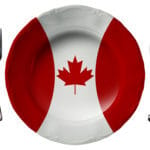
Canadians can expect to pay 3-5% more for food next year, according a new report from Dalhousie University. The increase will be driven by big jumps in the meat, vegetables, and fish and seafood sectors.
The predicted increase is higher than last year and higher than the normal rate of food inflation, which is pegged at 1-2%. The price increases will stem from a variety of factors, including climate, energy costs, inflation, retail and distribution, consumer income, and the Trump administration, which, the report states, “could spell a period of U.S. protectionism aimed at improving domestic issues, which could possibly be at the expense of the international community, including Canada.”
As a heavy importer of food, Canada’s food prices are “highly vulnerable to currency fluctuations.”
The report cites cauliflower as a particularly potent example of this vulnerability. In 2016, a perfect storm of sorts caused cauliflower prices to skyrocket. First low oil prices weakened the Canadian dollar, eroding its purchasing power. Then, California’s continuing drought meant higher prices at the grocery store. These two things combined raised the price of cauliflower in Canada to $8/head.
The authors predict that the value of the Canadian dollar will continue to drop in 2017.
Here are a few other trends the report forecasts for 2017:
Celebration of Canadian food. 2017 marks Canada’s 150 birthday, which is likely to prompt a “re-emergence of traditional Canadian food.”
Food science fears. Canada does not currently require labeling for GM products. But that may soon change thanks to public demands and the new Vermont labeling law. Health Canada recently approved a GM salmon as the first-ever GM livestock available to Canadian consumers, swimming into stores in 2018.
Food fraud awareness.2016 saw a few high-profile convictions in Canada for food fraud, which has already spurred increased awareness of the problem. One report from the University of Guelph suggests that up to one-third of fish in Canadian grocery stores are mislabeled.
To read the entire report, click here.